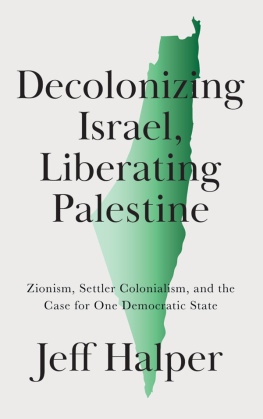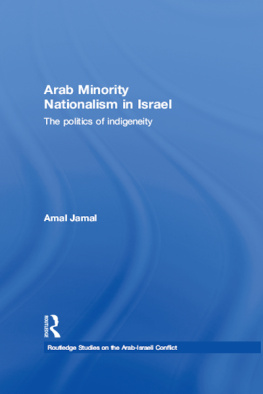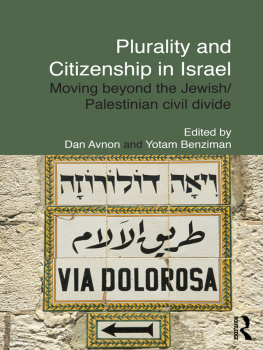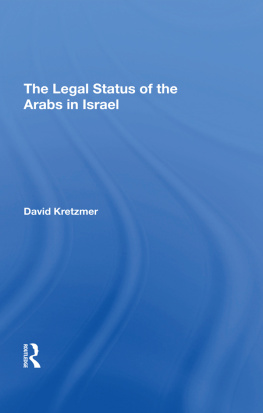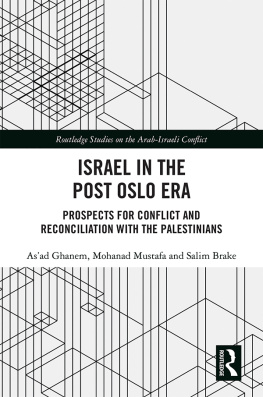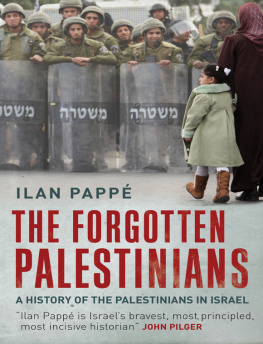Palestinians in Israel

First published 2012 by Pluto Press
345 Archway Road, London N6 5AA
www.plutobooks.com
Distributed in the United States of America exclusively by
Palgrave Macmillan, a division of St. Martins Press LLC,
175 Fifth Avenue, New York, NY 10010
Copyright Ben White 2012
The right of Ben White to be identified as the author of this work has been asserted by him in accordance with the Copyright, Designs and Patents Act 1988.
British Library Cataloguing in Publication Data
A catalogue record for this book is available from the British Library
ISBN 978 0 7453 3229 1 Hardback
ISBN 978 0 7453 3228 4 Paperback
ISBN 978 1 8496 4626 0 ePub
ISBN 978 1 8496 4627 7 Kindle
Library of Congress Cataloging in Publication Data applied for
This book is printed on paper suitable for recycling and made from fully managed and sustained forest sources. Logging, pulping and manufacturing processes are expected to conform to the environmental standards of the country of origin.
10 9 8 7 6 5 4 3 2 1
Designed and produced for Pluto Press by Chase Publishing Services Ltd Typeset from disk by Stanford DTP Services, Northampton, England Simultaneously printed digitally by CPI Antony Rowe, Chippenham, UK and Edwards Bros in the United States of America
To Ameer, Janan, Hind and Huda
From the window of my small cell
I can see trees smiling at me,
Rooftops filled with my people,
Windows weeping and praying
For me.
From the windows of my small cell
I can see your large cell.
Samih al-Qasim,
End of a Discussion with a Jailer

Contents
List of Maps, Figures and Photographs
Maps
Figures
Photographs
Acknowledgements
As ever, there are too many people to thank and acknowledge, and I ask forgiveness from those I forget.
Firstly, I want to thank my wife Amanda for her patience with me as I wrote this. My work is for you and our two beautiful children, Isabella and Daniel. Thank you also to my family for their love and support.
Secondly, thank you to Roger van Zwanenberg and everyone at Pluto Press for their encouragement and hard work.
Thank you to Paul, Nadia, and Asa, who gave of their time in order to give me invaluable feedback. A special thank you to Nadia, and the rest of the staff at Adalah, for their willingness to help and give advice.
Thank you to the following, who in different ways have helped, encouraged, shaped, and contributed to this project, knowingly or otherwise. In no particular order: MK Haneen Zoabi, Ahmad Barclay and Dena Qaddumi at arenaofspeculation.org, Malkit Shoshan, Matan Cohen, Ilan Pappe, Isabelle Humphries, Oren Yiftachel, Chris Toensing at Middle East Report, Hanan Chehata at Middle East Monitor, Rev. Garth Hewitt and the Amos Trust staff, Orna Kohn, Suhad Bishara, Sawsan Zaher, Gaby Rubin, Jonathan Cook, Hassan Jabareen, Badil, Mohammad Zeidan at HRA, Sliman Abu-Abaid and Yeela Raanan at the Regional Council for the Unrecognised Villages of the Negev, Esam and family, Bassam, Riya al-Sanah, Hind Awwad, Mansour Nsasra, Rebecca Vilkomerson at JVP, Andy Slaughter MP, John McDonnell MP, Karma Nabulsi, Asad Abu Khalil, Ali Abunimah, Yonatan Shapira, Omar Barghouti, Sami Awad and Holy Land Trust, William Dalrymple, Max Blumenthal, Ahdaf Soueif.
Finally, I would like to express gratitude, admiration, and love, to all those campaigners and activists particularly students I have met, collaborated with, and enjoyed time with, in the UK, Canada, and USA. Your energy, passion, and clarity of vision has always inspired and refreshed me.
Foreword
Haneen Zoabi
In seven chapters of penetrating analysis, author Ben White asks for a shift away from the paradigm of Occupation as the lens through which the Israeli-Palestinian conflict is viewed. For White, such a shift entails a dramatic transformation in the political assumptions and axioms that have prevailed in the post-Oslo era and, more importantly, a return to the historical and moral roots of the Palestinian question.
The argument that the relationship between Israel and the Palestinians is one of a conflict with a racist settler project that was founded on notions of ethnic purity is understood implicitly by all Palestinians. We Palestinians were quick to comprehend the relationship between ourselves as indigenous inhabitants of this land and those who came to take our place (in every sense) without even considering a common life with or alongside us, and without acknowledging that which had gone before them.
The core issue is not a shift in paradigm so much as a return to an old paradigm, that which dominated the Palestinian national liberation movement at least ten years prior to Oslo. I am a member of the political party that has revived this new/old paradigm, as a part of a larger Palestinian political project. The focus of this project moved from the Diaspora previously the heart of the Palestinian national movement to the West Bank and Gaza Strip following the First Intifada, before shifting once again to rest on a group that had been regarded as marginal to, or even outside, the Palestinian national movement: the Palestinians whom Israel didnt expel in 1948.
The Oslo Accords were the culmination of a gradual process of decline within the Palestinian national project that began with the expulsion of the Palestinian Liberation Organisation (PLO) from Lebanon in 1982, and were accompanied by a re-writing of history and redefinition of the Palestinian question. Before Oslo, the Palestinian issue was about the national liberation of the Palestinian people living in the Diaspora and in its homeland (in the 1948 and 1967 territories). It proposed a democratic solution for both Palestinians and Jews (and hence it also sought to liberate the Jews in Palestine from the racist project of which they are part).
Post-Oslo, the Palestinian question concentrated on the establishment of a state in the Palestinian territories occupied in 1967, and left intact the Jewish state that was constructed on the Palestinian territories occupied in 1948 and contains part of the Palestinian people. It was the result of the marriage of moderate Zionism and the lowest level of Palestinian aspirations, and according to the Oslo vision, there are no victims, no perpetrators and no acknowledgement of the legitimacy of resistance to the Occupation. It fails to view the Occupation from the perspective of values that is, as an egregious violation of humanity and dignity that both calls for and legitimises resistance.
However, Oslo also produced its own antithesis, in the form of a political project that was to redefine the Palestinian issue again as one of confrontation with the Zionist project (which did not begin in 1967 and does not only concern the territories occupied in 1967 but the entire Palestinian people, and even the wider Arab region). Significantly, Oslo produced this antithetical project within the very group that it excluded: the Palestinians in Israel.
The paradigm of Occupation approached the Palestinians inside Israel as an internal Israeli matter. In response, this segment of the Palestinian people reformulated their national project in a manner that was to secure their reintegration into the Palestinian people and guarantee their place as an integral part of the Palestinian issue, both as part of the conflict and as part of the solution.
The Palestinians in Israel have been able to achieve this turnabout only by reinventing the confrontation with the Zionist project, of which they are a direct and historically the oldest outcome. Ironically, it was their Israeli citizenship that enabled them to do so. The Palestinians in Israel have successfully employed the contradiction between Zionism and democratic citizenship that was imposed on them to reconstruct their national project.
Next page


